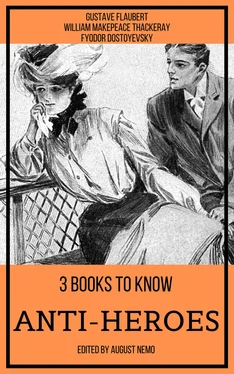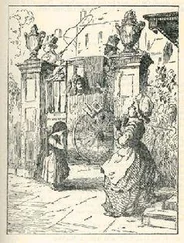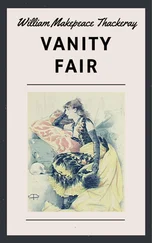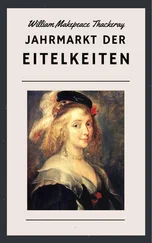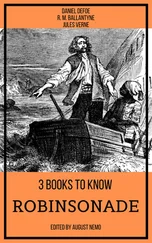‘It is possible that he expected some such dreadful catastrophe, for, after hearing Hengst’s narrative (as the latter afterwards told me), he only said, “Heaven’s will be done!” for some time refused to stir a step in the matter, and then only by the solicitation of his friend was induced to write the letter which Maxime de Magny received at our play-table.
‘Whilst he was there, squandering the Princess’s money, a police visit was paid to his apartments, and a hundred proofs, not of his guilt with respect to the robbery, but of his guilty connection with the Princess, were discovered there,—tokens of her giving, passionate letters from her, copies of his own correspondence to his young friends at Paris,—all of which the Police Minister perused, and carefully put together under seal for his Highness, Prince Victor. I have no doubt he perused them, for, on delivering them to the Hereditary Prince, Geldern said that, IN OBEDIENCE TO HIS HIGHNESS’S ORDERS, he had collected the Chevalier’s papers; but he need not say that, on his honour, he (Geldern) himself had never examined the documents. His difference with Messieurs de Magny was known; he begged his Highness to employ any other official person in the judgment of the accusation brought against the young Chevalier.
‘All these things were going on while the Chevalier was at play. A run of luck—you had great luck in those days, Monsieur de Balibari—was against him. He stayed and lost his 4000 ducats. He received his uncle’s note, and such was the infatuation of the wretched gambler, that, on receipt of it, he went down to the courtyard, where the horse was in waiting, absolutely took the money which the poor old gentleman had placed in the saddle-holsters, brought it upstairs, played it, and lost it; and when he issued from the room to fly, it was too late: he was placed in arrest at the bottom of my staircase, as you were upon entering your own home.
‘Even when he came in under the charge of the soldiery sent to arrest him, the old General, who was waiting, was overjoyed to see him, and flung himself into the lad’s arms, and embraced him: it was said, for the first time in many years. “He is here, gentlemen,” he sobbed out,—“thank God he is not guilty of the robbery!” and then sank back in a chair in a burst of emotion; painful, it was said by those present, to witness on the part of a man so brave, and known to be so cold and stern.
‘“Robbery!” said the young man. “I swear before Heaven I am guilty of none!” and a scene of almost touching reconciliation passed between them, before the unhappy young man was led from the guard-house into the prison which he was destined never to quit.
‘That night the Duke looked over the papers which Geldern had brought to him. It was at a very early stage of the perusal, no doubt, that he gave orders for your arrest; for you were taken at midnight, Magny at ten o’clock; after which time the old Baron de Magny had seen his Highness, protesting of his grandson’s innocence, and the Prince had received him most graciously and kindly. His Highness said he had no doubt the young man was innocent; his birth and his blood rendered such a crime impossible; but suspicion was too strong against him: he was known to have been that day closeted with the Jew; to have received a very large sum of money which he squandered at play, and of which the Hebrew had, doubtless, been the lender,—to have despatched his servant after him, who inquired the hour of the Jew’s departure, lay in wait for him, and rifled him. Suspicion was so strong against the Chevalier, that common justice required his arrest; and, meanwhile, until he cleared himself, he should be kept in not dishonourable durance, and every regard had for his name, and the services of his honourable grandfather. With this assurance, and with a warm grasp of the hand, the Prince left old General de Magny that night; and the veteran retired to rest almost consoled, and confident in Maxime’s eventual and immediate release.
‘But in the morning, before daybreak, the Prince, who had been reading papers all night, wildly called to the page, who slept in the next room across the door, bade him get horses, which were always kept in readiness in the stables, and, flinging a parcel of letters into a box, told the page to follow him on horseback with these. The young man (Monsieur de Weissenborn) told this to a young lady who was then of my household, and who is now Madame de Weissenborn, and a mother of a score of children.
‘The page described that never was such a change seen as in his august master in the course of that single night. His eyes were bloodshot, his face livid, his clothes were hanging loose about him, and he who had always made his appearance on parade as precisely dressed as any sergeant of his troops, might have been seen galloping through the lonely streets at early dawn without a hat, his unpowdered hair streaming behind him like a madman.
‘The page, with the box of papers, clattered after his master,—it was no easy task to follow him; and they rode from the palace to the town, and through it to the General’s quarter. The sentinels at the door were scared at the strange figure that rushed up to the General’s gate, and, not knowing him, crossed bayonets, and refused him admission. “Fools,” said Weissenborn, “it is the Prince!” And, jangling at the bell as if for an alarm of fire, the door was at length opened by the porter, and his Highness ran up to the Generals bedchamber, followed by the page with the box.
‘“Magny—Magny,” roared the Prince, thundering at the closed door, “get up!” And to the queries of the old man from within, answered, “It is I—Victor—the Prince!—get up!” And presently the door was opened by the General in his ROBE-DE-CHAMBRE, and the Prince entered. The page brought in the box, and was bidden to wait without, which he did; but there led from Monsieur de Magny’s bedroom into his antechamber two doors, the great one which formed the entrance into his room, and a smaller one which led, as the fashion is with our houses abroad, into the closet which communicates with the alcove where the bed is. The door of this was found by M. de Weissenborn to be open, and the young man was thus enabled to hear and see everything which occurred within the apartment.
‘The General, somewhat nervously, asked what was the reason of so early a visit from his Highness; to which the Prince did not for a while reply, farther than by staring at him rather wildly, and pacing up and down the room.
‘At last he said, “Here is the cause!” dashing his fist on the box; and, as he had forgotten to bring the key with him, he went to the door for a moment, saying, “Weissenborn perhaps has it;” but seeing over the stove one of the General’s couteaux de chasse, he took it down, and said, “That will do,” and fell to work to burst the red trunk open with the blade of the forest knife. The point broke, and he gave an oath, but continued haggling on with the broken blade, which was better suited to his purpose than the long pointed knife, and finally succeeded in wrenching open the lid of the chest.
‘“What is the matter?” said he, laughing. “Here’s the matter;—read that!—here’s more matter, read that!—here’s more—no, not that; that’s somebody else’s picture—but here’s hers! Do you know that, Magny? My wife’s—the Princess’s! Why did you and your cursed race ever come out of France, to plant your infernal wickedness wherever your feet fell, and to ruin honest German homes? What have you and yours ever had from my family but confidence and kindness? We gave you a home when you had none, and here’s our reward!” and he flung a parcel of papers down before the old General; who saw the truth at once;—he had known it long before, probably, and sank down on his chair, covering his face.
Читать дальше
